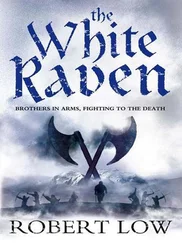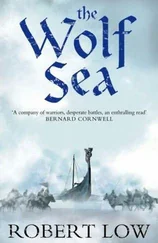At the stream, we refilled leather skins and bottles, soaked our heads, and considered how best to go on.
There were seven of us with wounds likely to slow everyone down and I was one of them, but we were paired with others who helped us back up the brush-covered ravines and on to the steppe.
Thereafter, it was simply a long world of pain, step by fire-laced step, hour after hour, back to Kiev.
That ankle has never been right since; it aches in cold weather and, now and then, simply gives out and throws me over like a sack of grain, always when I am trying to impress with my gravitas and dignity. Each time it flicks pain at me, I remember Gunnar Raudi.
Others suffered much more. By the second day, the man whose forearm had been speared was running a high fever and his arm had swollen like a balloon. By the time we reached the outskirts of Kiev he was being carried in a cloak held at all four corners by his oarmates, drenched in sweat and moaning piteously, while the arm had turned black to the armpit.
Illugi tried what he knew, a potion made from bark of aspen, quickbeam, willow and wych-elm: fifteen barks in all made up this one. It failed, so he tried a poultice made from the ashes of burned hair and everyone contributed some, even Bersi, whose waist-length flame-red hair had never, ever been cut and who believed it bad luck to do so.
It was certainly bad luck for Illugi's patient, who died thrashing in his sleep that night in Kiev, having made it to safety. I watched him being wrapped for burial and knew only that his name was Hedin and that he had once kept bees in Uppsala.
On the open steppe we had spotted distant horsemen, beyond arrow range and moving with us like a pack of questing wolves. But they did not come near and everyone agreed it was probably because we had come out of the tomb. Perhaps, it was argued, they thought we were fetch warriors and did not dare to contest us.
I thought it was because of Hild, the only one unconcerned by them. She walked with bold, long strides in her red half-boots, swishing the skirt of her long, blue, red-embroidered dress and only slightly soiled overmantle, a Rus zanaviska, her dark hair spilling free.
She was the perfect picture of a Norse maiden—until she turned to look at you and you saw that almost all her eyes were almost entirely black, all dark pupil, with only a thin corona of white. Regin's kinswoman and, if you knew of him, you could see the resemblance.
Ìs that the same Regin from the tales, then?' demanded Bersi during one rest halt, when we all hunkered and panted, wiping sweat out of our eyes. 'Sigurd's oarmate?'
`So she seems to say,' Skarti growled, glancing uneasily at where Hild sat, neat in her dress and staring at the horizon.
`Not an oarmate,' growled Bagnose, putting one finger to his nose and snotting to the side.
Èh?'
`Not an oarmate,' repeated Bagnose. 'Re-gin had Sigurd as fostri. He was brother to Fafnir, who became a dreaded wyrm through gold-greed and a curse. Regin was a skilled smith, though, who made Sigurd a marvellous sword. Sigurd killed Fafnir the wyrm and ate his heart, which gave him wisdom to see Regin planned his murder, so he killed Regin, too.'
`That's a lot of killing, it seems to me,' Steinthor said, 'even for a saga tale.'
Òver a hoard, too,' noted Bersi and we all fell silent, brooding on that, until it was time to move off.
Ìt's all just tales for fucking children,' growled Wryneck. 'Why we bother with this is the only mystery in it.'
Two other men died in Kiev, of the same sort of thing, their wounds swelling and turning black. A Greek doctor, whom Illugi summoned in desperation, shook his head and said the men must have had something get in the wound, a miasmic rot that festered their injuries.
We never told him where we had been, but knowing looks were exchanged. Dengizik's reach was long, it seemed, and everyone agreed that it had been deep thinking not to have taken his swords, even if they had been Regin's work.
We wrapped and buried our dead in Kiev and I listened to Illugi's soft, long chants on the wyrd of men, one usually sung by mothers mourning children.
Deep into the night before the army left for Sarkel it went on, for Gunnar Raudi, for all the others who had died and, I was thinking, hunched up with my chin on my knees, for Illugi himself and his lost gods:
`Hunger will devour one, storm dismast another,
One will be spear-slain, one hacked down in battle;
One will drop, wingless, from the high tree,
One will swing from the tall gallows,
The sword edge will shear the life of one,
At the mead-bench, some angry sot,
Soaked with wine, his words too hasty,
Will cut one down and make his wyrd.'
A thousand barrels of ale, fifty thousand sheep, the same in bushels of barley, the same yet again in bushels of millet and wheat. Sixty thousand horses, ropes, awnings, tents, hoes, mattocks . . . I heard all this when accounts of the siege were being studiously written up by scholars in the Great City, years later.
I remember one old beard, pen poised, blinking at me as we sat with olives and bread and wine on my pleasant balcony in the Foreign Quarter, enjoying the breeze across the Horn from Galata.
`How many cheesemakers?' he asked and frowned when I laughed.
I told him a number, but I doubt if there were any. I never saw a decent cheese in all the time we floated with Sviatoslav's army down the Don, or sat under those rune-tiled walls at Sarkel, sweating and fevered and scheming and trying not to die before we got rich.
If we had needed cheese, though, Sviatoslav would have provided it. For a man who famously made war on the run, as they say—no wagons, no means of cooking, just strips of leathery meat sweat-soaked under a saddle—he had changed his methods for the attack on Sarkel.
I saw him once, while sweating to load arrows and barrels of salt mutton—no pork, for half of his army wouldn't eat it, for one reason or another—on the boats, already packed with timbers and Greek siege engineers. There was a great commotion along the river bank, men cheering and breaking off what they were doing to run and line the route a cavalcade was taking.
It was Sviatoslav, cantering along in a cloud of dust at the head of his druzhina, mailed men with horsehair-plumed helmets and bright blue fur-trimmed cloaks, mounted on magnificent horses. In this heat, they would be baking ovens, but the forest of their lances never wavered.
He was visiting each of his sons and it was Yaropolk's turn, but we were too late to turn out smartly for it.
To Einar's annoyance, the Oathsworn greeted the moment like gawping yokels, stripped to the waist, streaked and sweating and loading gear like slaves mainly because we didn't trust the slaves to do it properly.
I don't know what I had expected, but the ruler of the Rus, of Kiev and Novgorod, who controlled from the Baltic to the edge of the territory ruled by the Romans of Miklagard, was a burly little man with a nub of nose and a yellow beard.
He wore white tunic and trousers, like all the Rus under their armour, but his were dazzlingly clean. His head was shaved save for that silver-banded braid over one ear. There was the sparkle of a huge gold ring in the other.
`Not much to look at, is he?' grunted Bersi, pausing in his lifting. He wiped his brow, his great mane of red hair plastered to the middle of his back with sweat.
`You can tell him that when he shoves a stake up your arse and leaves you hanging there,' countered Wryneck, swigging watered ale from a skin. He wiped his snow-white beard and tossed the ale skin to me.
Ìs that what they do here? For what?' demanded Bersi incredulously.
'For some, it is saying the Great Lord of Kiev is not much to look at,' a voice broke in and we turned to see one of the magnificent cavalrymen, helmet held in the crook of his arm, his bald head glistening.
Читать дальше
Конец ознакомительного отрывка
Купить книгу











